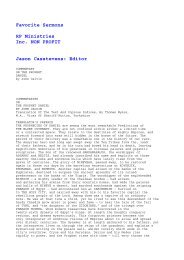Lamentations - The Sermon Depository
Lamentations - The Sermon Depository
Lamentations - The Sermon Depository
You also want an ePaper? Increase the reach of your titles
YUMPU automatically turns print PDFs into web optimized ePapers that Google loves.
y Jeremiah: his object was to shew that though nothing in the land<br />
appeared but desolation, and the Temple being destroyed, the Covenant of<br />
God appeared as made void, and thus all hope of salvation had been cut<br />
off, yet hope still remained, provided the people sought God in true<br />
repentance and faith; and he thus proceeded in the course of his calling, and<br />
made it evident that his doctrine would not be without benefit.<br />
He indeed bewails, as I have said, the extreme calamity of his people; but<br />
he mingles with his lamentations the doctrine of repentance and faith’ For,<br />
on the one hand, he shews that the people suffered a just punishment for<br />
the many iniquities, of which they could not have been healed; and then,<br />
on the other hand, he gives them some intimations of God’s mercy, that in<br />
death itself the Jews might seek life, nay, that in the lowest depths they<br />
might know that God would be propitious to them. He at length by his<br />
own example stimulates them to pray; but prayer is founded on faith. It<br />
then follows, that Jeremiah, when the people had become wholly alienated<br />
from the worship of God, yet spent his labor in collecting together the<br />
remnant. Though, then, the whole Church was not only in the greatest<br />
disorder, but also reduced as it were almost to nothing, yet Jeremiah<br />
constructed some sort of building out of the ruins. This is the substance of<br />
this Book.<br />
<strong>The</strong> Greek Translators call this Book Qrh>nouv, <strong>Lamentations</strong>, and very<br />
properly, as also the Hebrews call it hwnyq, kinut; though the common<br />
name or title is hka, aike, from the first word in it. But when they wish<br />
to express what the Book contains, they call it twnyq, kinut,<br />
<strong>Lamentations</strong>.<br />
Let us now proceed to the words; for what I have now briefly touched<br />
upon, can be more fully explained as we go on.<br />
CHAPTER 1<br />
LECTURE FIRST.<br />
<strong>Lamentations</strong> 1:1<br />
1. How doth the city sit solitary<br />
that was full of people! How is<br />
she become as a widow! She that<br />
was great among the nations, and<br />
princess among the provinces,<br />
how is she become tributary!<br />
1. Quomodo sedet solitaria<br />
civitas, quae abundavit populo!<br />
facta est tanquam vidua, quae<br />
magna fuit in gentibus! Quae<br />
dominataest in provinciis,<br />
redacta est ad tributum!<br />
<strong>The</strong> Prophet could not sufficiently express the greatness of the calamity,<br />
except by expressing his astonishment. He then assumes the person of one<br />
who on seeing something new and unexpected is filled with amazement. It<br />
was indeed a thing incredible; for as it was a place chosen for God to dwell<br />
in, and as the city Jerusalem was not only the royal throne of God, but<br />
also as it were his earthly sanctuary, the city might have been thought<br />
exempted from all danger. Since it had been said,<br />
“Here is my rest for ever, here will I dwell,”<br />
(Psalm 132:14,)<br />
God seemed to have raised that city above the clouds, and to have rendered<br />
it free from all earthly changes. We indeed know that there is nothing fixed<br />
and certain in the world, and that the greatest empires have been reduced to<br />
nothing; but, the state of Jerusalem did not depend on human protection,<br />
nor on the extent of its dominion, nor on the abundance of men, nor on any<br />
other defenses whatever, but it was founded by a celestial decree, by the<br />
promise of God, which is not subject to any mutations. When, therefore,<br />
the city fell, uprooted from its foundations, so that nothing remained,<br />
when the Temple was disgracefully plundered and then burnt by enemies,<br />
and further, when the king was driven into exile, his children slain in his<br />
presence, and also the princes, and when the people were scattered here



